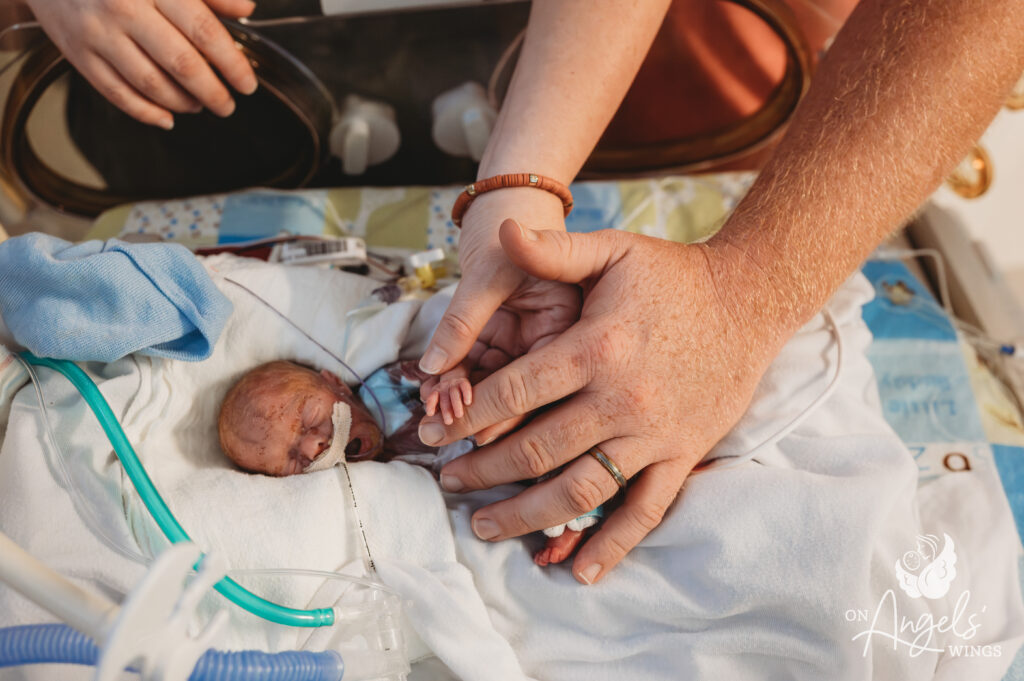By Seraine Page
Pregnancy is a journey filled with milestones and emotions, but it’s natural for questions to arise, especially about the possibility of delivering early. Understanding the possibility of preterm labor, the premature birth definition, and the premature birth signs is the first step to feeling prepared.
A premature birth happens when a baby arrives before 37 weeks of pregnancy, and while this can feel overwhelming, understanding what it means can help you feel more prepared.
Here, we’ll explain the signs to watch for, share premature birth survival rates by week in clear terms, and guide you toward resources that offer comfort and support along the way.
Whether you’re currently expecting or planning for the future, knowing what to look for can make all the difference for you and your baby.
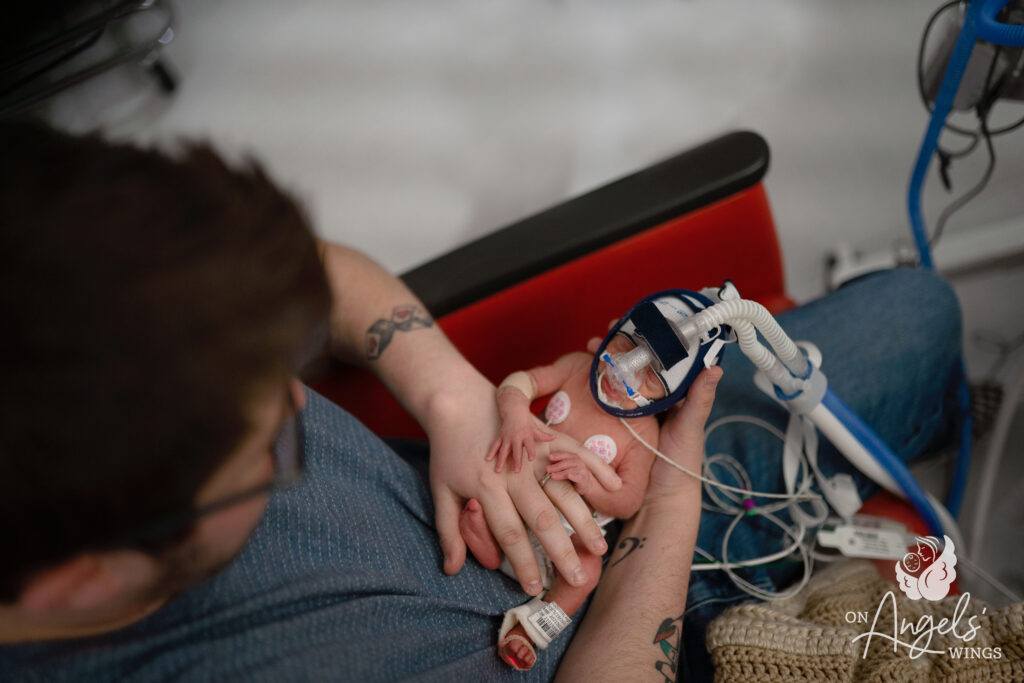


Premature Birth Meaning: When Babies Arrive Too Soon
When doctors use the word premature, they’re simply talking about timing — specifically, a baby arriving earlier than expected.
In 2020 alone, 13.4 million babies were born preterm, according to the World Health Organization. One out of every 10 births in the U.S is premature.
A “premature birth meaning” refers to when a baby is born before 37 completed weeks of pregnancy. While that might not seem far from the due date, every week inside the womb matters for growth and development.
There are three main types of premature birth, based on how early the baby arrives:
- Late preterm: Born between 34 and 36 weeks. These babies are close to full term but may still need extra monitoring.
- Moderately preterm: Born between 32 and 34 weeks.
- Very preterm: Born between 28 and 32 weeks. These babies often require specialized medical care in a neonatal intensive care unit (NICU).
- Extremely preterm: Born before 28 weeks. These little ones (often called “micro preemies”) face the biggest challenges and benefit most from advanced neonatal care that often lasts up to or even beyond their original due date.
Why does timing matter so much?
Each week in the womb gives a baby more time to develop vital organs — especially the lungs, brain, and heart — making them better prepared for life outside the womb. Understanding premature birth can help parents recognize the importance of monitoring for signs and getting the right care if early labor begins.


Related: Ready Walker’s Story
Premature Birth Signs to Watch For
There’s a reason the “Count the Kicks” campaign exists; knowing your baby’s movement patterns can help pregnant moms in the third trimester stay aware of their growing baby’s health.
A quick reminder on how to count kicks:
- Start a timer – Record the time it takes to feel 10 movements from your baby.
- Keep count – Choose a time when your baby is active to start counting; ideally, this is the same time each day.
- Watch for patterns – At the time of recording your daily session, write it down (a Notes app works great) and compare it to previous sessions.
- Stay alert – Notice a change? Go to the labor and delivery unit at the hospital ASAP.
Aside from tracking kicks, there are other possible early warning signs of premature birth during pregnancy to be aware of.
Premature birth signs include:
- Contractions or tightening that come regularly before 37 weeks
- Sudden increase or change in vaginal discharge
- Pelvic pressure or low belly pressure
- Continuous low, dull backache
- Water breaking
- Belly cramping
Important note: To better help your healthcare provider pinpoint what’s going on with your baby and your body, track symptoms — note timing, intensity, and changes.
Why Early Action Matters
Luckily, these symptoms don’t always mean automatic labor, but they should be checked right away. Even if you’re only having one of the above symptoms, reach out to your healthcare provider for the best next steps. Providers may provide treatment to stop labor or improve a baby’s health before birth, according to the March of Dimes website.

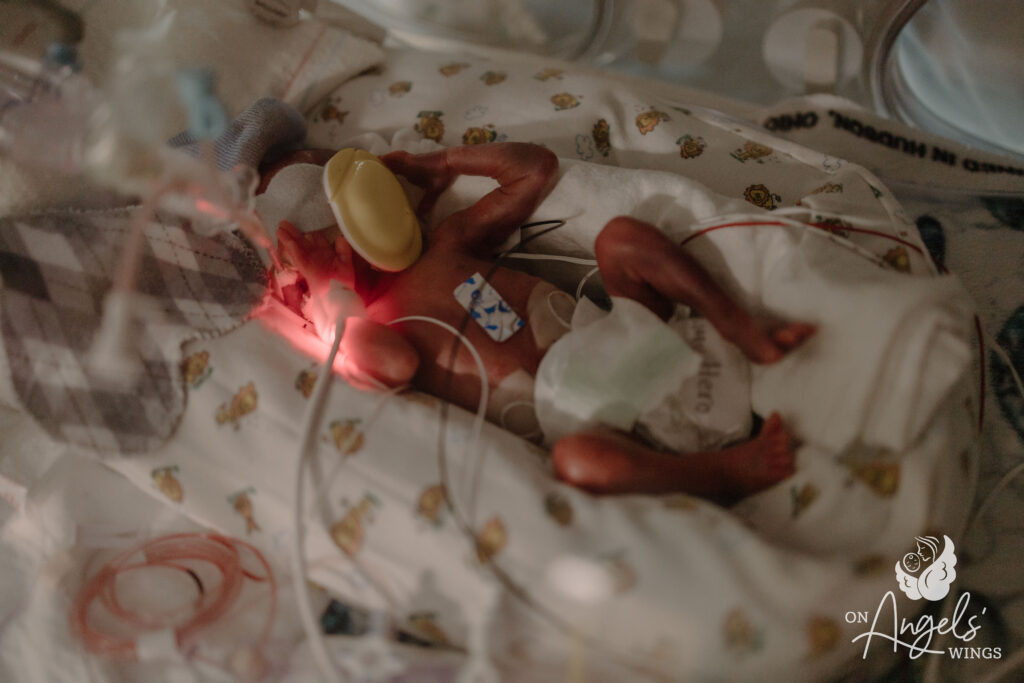
Related: Read Micah’s Story
Health Complications of a Premature Birth
Premature babies may struggle with life outside the womb since their vital organs do not have enough time to fully develop. Due to this, serious health complications may arise — the earlier the baby is born, the more likely they’ll need neonatal intensive care unit (NICU) treatment, according to the American Pregnancy Association.
Below are the most common health issues premature babies face:
Premature babies may struggle with life outside the womb since their vital organs do not have enough time to fully develop. Due to this, serious health complications may arise — the earlier the baby is born, the more likely they’ll need neonatal intensive care unit (NICU) treatment, according to the American Pregnancy Association.
Below are the most common health issues premature babies face:
- Anemia – Not having enough healthy red blood cells to carry oxygen throughout the body.
- Apnea of prematurity – Temporary breathing pauses.
- Intraventricular hemorrhage – Brain bleeding.
- Newborn jaundice – A liver condition that causes yellowing of the skin.
- Necrotizing enterocolitis – Intestinal inflammation.
- Neonatal sepsis – Blood infection.
- Patent ductus arteriosus (PDA) – Abnormal heart blood flow.
- Retinopathy of prematurity – Underdeveloped eye blood vessels.
One major concern for premature babies is underdeveloped lungs. Babies have fully developed lungs at 36 weeks old, typically. Sometimes, amniocentesis may be performed to check the maturity level of the lungs if a provider suspects the baby may arrive early. Additionally, an injection of steroids may speed up lung development. Otherwise, underdeveloped lungs may lead to respiratory issues like transient tachypnea and bronchopulmonary dysplasia (BPD).


Long-Term Health Complications
While some complications may not be obvious immediately post birth, they can still develop later in life.
Other premature baby complications down the road may include:
- Behavior and mental health issues
- Hearing and vision problems
- Dental problems
- Learning disabilities
- Cerebral palsy
- Poor growth
Compared to full-term babies, premature babies are at a higher risk of developing complicated health conditions that are long-term concerns. Illnesses, including asthma and feeding problems, are more likely to develop, according to Mayo Clinic. Researchers aren’t sure why, but there’s also a higher risk of sudden infant death syndrome (SIDS).
Corrected Age for Premature Babies
Because premature babies, or “preemies” as they’re often called, come into the world with numerous and complicated health challenges, they are often delayed at hitting developmental milestones.
There’s a term known as “adjusted age” that you’ll hear often from your pediatrician and your child’s specialists. This number is calculated by subtracting the number of weeks your baby was born early from your baby’s actual age in weeks (number of weeks since the date of birth).
Enfamil has a calculator that makes it easy to input and find your baby’s adjusted age.
It’s important to keep the adjusted age in mind when it comes to milestone leap timelines, but any concerns are always valid to bring up to a pediatrician.


Related: Read Fred’s Story
Premature Birth Survival Rates by Week
Most pregnant women want to know the pressing question, “How early is too early for survival?” if they’ve been told they may have a premature birth.
Generally, infants born before 24 weeks of gestation struggle to survive, according to the University of Utah Health. Of those that survive, around 40 percent will have long-term health issues. In many cases, preterm labor can be delayed, but not always stopped completely. Hospitals may admit a mom going into preterm labor at 22-25 weeks to try and keep her pregnant even one to two weeks longer, further increasing the baby’s chances of survival significantly.
Additionally, here’s how survival rates change by week:
Before 22 weeks: The survival rate is usually less than 20%
23 weeks – A Stanford Medicine report shared that of preemies born at 23 weeks, 55% survived.
24–25 weeks: In one study, survival ranged from 24.9% at 22 weeks to 82.1% at 25 weeks, according to a Pediatrics journal article published in October 2024.
26–28 weeks: Survival rate of 89%; only 10 percent of babies born at 28 weeks are at risk for long-term complications.
29–33 weeks: Strong survival rates at 99%, though NICU support may be needed, sometimes for several weeks.
34–36 weeks: These “late preterm” babies have a nearly 100% chance of survival.
A note of hope: Each year, outcomes continue to improve thanks to medical advances. Overall, preemies’ survival rates have increased significantly between 2013 and 2018, according to Stanford Medicine. Additionally, parents who seek early intervention programs may get help from state-run organizations to minimize the cognitive effects of premature birth.
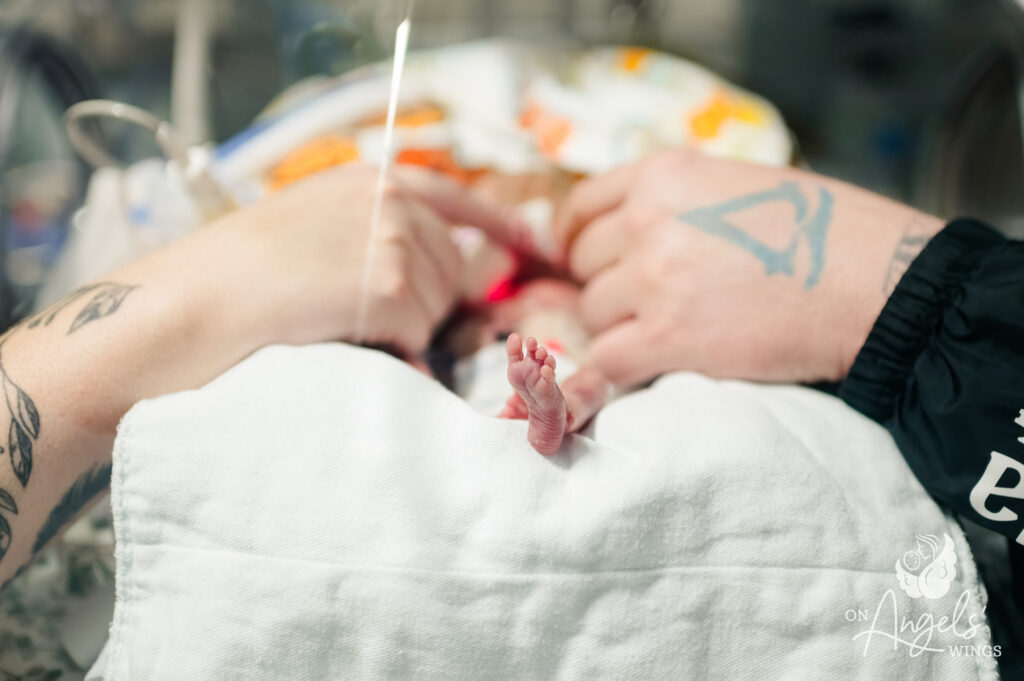

Getting Ready: Medical and Emotional Support
When you’ve been told that premature birth may be a possibility, it’s normal to feel anxious. Knowing what to expect and how to prepare can ease some of that worry.
Your healthcare team plays a key role in this process. Neonatologists, maternal-fetal medicine specialists, and NICU nurses are trained to support babies who arrive too soon and to guide parents through the journey.
They’ll help explain the meaning of premature birth in simple terms, walk you through possible scenarios, and answer questions about your baby’s health along the way.
From a medical standpoint, your doctor may recommend treatments such as steroid injections to help your baby’s lungs develop before delivery, or hospital admission to keep you on bed rest and monitor you closely (with the hope of delaying preterm labor as long as possible). These steps are especially important when premature birth signs appear early, giving your baby the best chance for strong survival and recovery.
Emotional support matters just as much. It’s important to recognize you may also experience grief as part of your pregnancy journey if it’s not going the way you planned. Grief recovery support can help you cope better mentally — while also acknowledging your loss, whatever that may look like — during and after your pregnancy.
Lean on family and friends, but also consider parent support groups, online communities, or local hospital programs that connect you with others facing similar challenges. Many parents also find helpful sites like Pathways.org that track milestones and provide encouragement. Preparing for a possible premature birth is about more than medicine — it’s about surrounding yourself with information, resources, reassurance, and hope.

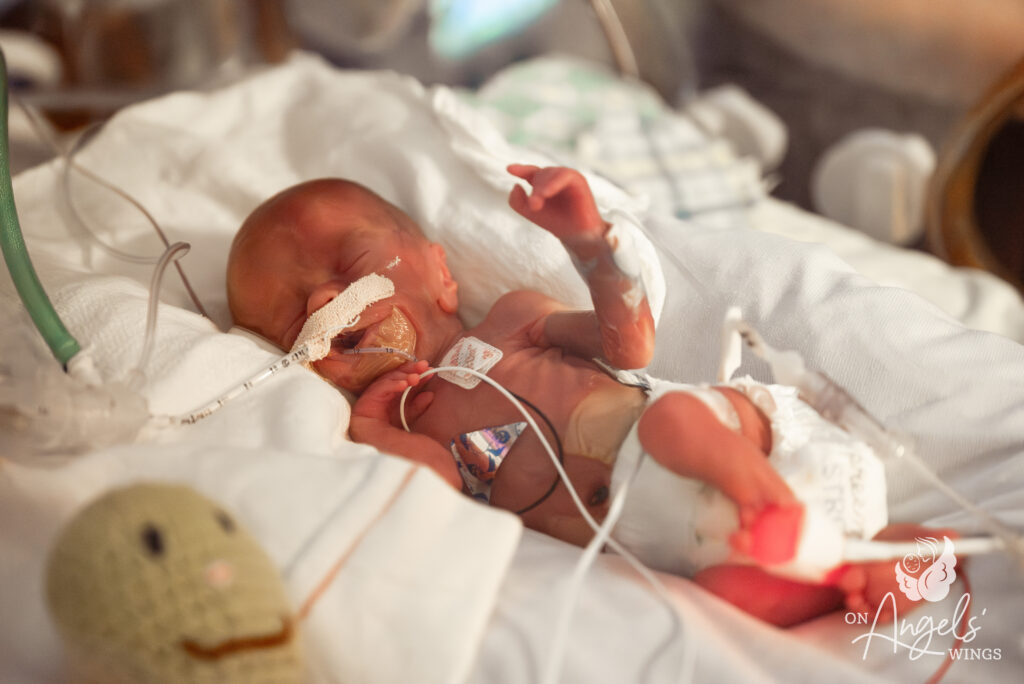
Related: Read Theo’s Story
Treatment Centers for Premature Birth and NICU Care
Because premature babies often face unique medical challenges, they need care from a range of specialists, including neonatologists, maternal-fetal medicine specialists, and NICU nurses. These teams provide advanced medical treatments and emotional support for families navigating preterm birth.
Here are some hospitals to consider receiving your healthcare treatment when it comes to your baby’s delivery and ongoing monitoring.
Hospitals in OAW Service Areas
Oklahoma Children’s Hospital (Oklahoma City, OK) – Offers Level IV NICU care with access to pediatric subspecialists and advanced treatments for premature and critically ill newborns.
University of Arkansas for Medical Sciences (Little Rock, AR) – Provides comprehensive maternal and neonatal care, including a Level IV NICU that serves as a referral center for the state.
Washington University/St. Louis Children’s Hospital (St. Louis, MO) – One of the region’s top-ranked children’s hospitals with a nationally recognized NICU program.
UChicago Medicine Comer Children’s Hospital (Chicago, IL) – Houses a Level IV NICU offering the most advanced technology and care for micro-preemies and high-risk pregnancies.
Children’s Minnesota (Minneapolis & St. Paul, MN) – Operates the largest Level IV NICU in the region, providing specialized care for premature infants and complex neonatal conditions.
Additional NICU and Prematurity Treatment Facilities
Wolfson Children’s Hospital (Jacksonville, FL) – Offers specialized neonatal care and maternal-fetal medicine support for high-risk pregnancies and premature babies.
Nicklaus Children’s Hospital (Miami, FL) – Level III NICU with comprehensive neonatal transport and advanced subspecialty care.
Children’s Healthcare of Atlanta (Atlanta, GA) – Provides advanced neonatal intensive care services with one of the largest NICUs in the Southeast.
University of Michigan C.S. Mott Children’s Hospital (Ann Arbor, MI) – Features a state-of-the-art Level IV NICU with a full range of specialists for high-risk deliveries and preterm infants.
Helen DeVos Children’s Hospital (Grand Rapids, MI) – Offers a large NICU program with dedicated family support resources for parents of premature infants.
Premature Birth Resources & Support
Below is a list of resources to learn more about premature birth and get support from others experiencing it as well.
We hope the above information and resources help you or someone you know going through the challenges of a premature birth experience. If your baby was born prematurely, On Angels’ Wings offers FREE NICU milestone therapeutic photography services for babies born at 28 weeks of gestation or earlier. Please reach out to request a professional photo session.


